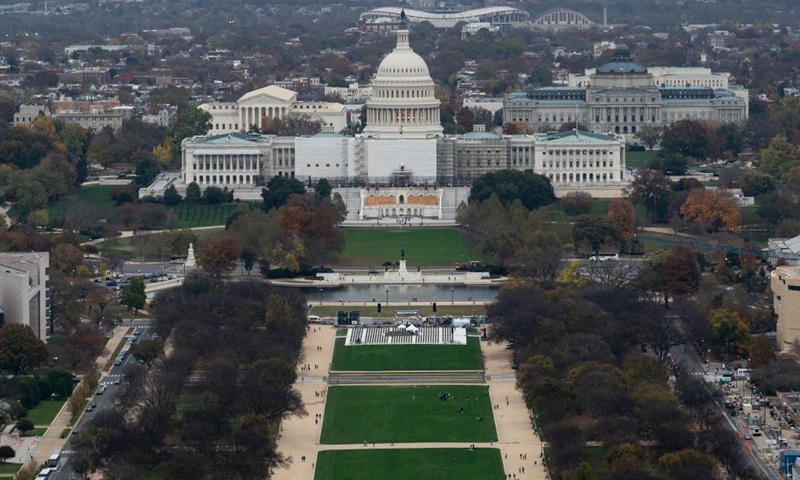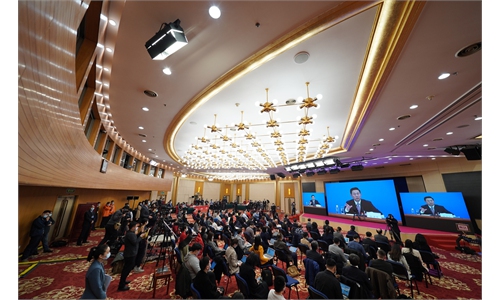Partisan struggles 'to make China-US ties more uncertain' as Republicans win House

The US Capitol building is seen in Washington, D.C. Nov. 10, 2022. (Xinhua)
Intense partisan struggles between Democrats and Republicans in the US will be further intensified, said analysts on Thursday as Republicans captured control of the US House of Representatives.
Republicans are believed to compete with Democrats using a more hostile and hawkish approach against China, and observers noted China-US relations will be more uncertain and that more tensions are very likely to emerge.
Facing such a situation, the White House, the administration of President Joe Biden, need to play a responsible role to balance and manage the risks, as Biden has repeatedly stated that he wants to set "guardrails" for the bilateral ties to prevent conflict and a new cold war, Chinese experts said.
According to Reuters, the latest victory gives Republicans the power to rein in Biden's agenda, as well as to launch politically damaging probes of the Biden administration and his family. But it fell far short of the "red wave" the party had hoped for.
Diao Daming, an associate professor at the Renmin University of China in Beijing, told the Global Times on Thursday that Republicans failed to take the Senate, so on agenda setting, the party has gained limited influence. But they can exercise veto power against agendas that Biden wants to advance, so the partisan struggles will be further intensified, and Biden's governance will meet more obstacles.
A split US Congress - which in January will end two years of unified Democratic control in Washington DC - is sure to complicate the second half of Biden's term, as Republicans gain the ability to launch investigations and block legislation, the Washington Post reported Wednesday.
Diao said Republicans are likely to launch investigations on many issues against the Biden administration, such as the pullout from Afghanistan, failed handling over the COVID-19 pandemic, and even targeting the president's son Hunter Biden. "To make Joe Biden look like an impeached president, to damage his image may give Republicans greater chance in the presidential election in 2024."
Diao also said, "Republicans will use their power to defend Trump from investigations launched by Democrats, as some Republicans have threatened the Department of Justice of cutting its budget if it keeps 'prosecuting' the former president by investigation."
Besides more intensified partisan struggles between the Senate and the House, more struggles will occur between the White House and the Capitol Hill, Li Haidong, a professor from the Institute of International Relations at the China Foreign Affairs University, told the Global Times on Thursday.
But Li saw from the midterms results that "centrists in both Democrats and Republicans are rising, and the extreme forces like the far-right and far-left are losing influence."
If Republicans want to win in 2024, they can't split themselves from Trump, as Trump's popularity is still unshakable within the party, so some experts said it's likely to see Trump team up with another candidate with similar ideology but more favored by the pro-establishment elites, such as Florida's governor Ronald Dion DeSantis.
Republicans like Kevin McCarthy have already vowed more hostile actions against China before the midterm elections, such as further decoupling, to reduce US-China interdependency, and to set a special committee on China affairs. All of these are serving Republicans' goal to win over Democrats on dominance in policymaking on China, Diao said.
Bloomberg reported Thursday that Republicans are expected to pressure Biden to pursue a more hawkish approach to China now that they've won control of the House of Representatives.
Representative Michael McCaul, the Republican in line to head the House Foreign Affairs Committee, said his top priority will be competing with a rising China, including monitoring high-tech exports, Reuters reported.
Republicans in the House will likely use the Taiwan question to provoke China and could mimic what Pelosi did in August, adding new danger to the peace and stability of the Taiwan Straits, experts said.
On climate change, one of the very few topics that the US and China can have concrete dialogues and cooperation, Republicans will bring more difficulties to Biden, they said.
Lü Xiang, an expert on US studies and research fellow at the Chinese Academy of Social Sciences, told the Global Times on Thursday that "if Biden wants to prevent direct conflict with China and a new cold war, just as what he reiterated in the meeting with China's top leader, he should pay efforts balancing Republicans' potential provocative moves in the future."
If Biden decides to compete with Republicans by racing to be tougher toward China, the bilateral ties will break "guardrails" that he claims to want to build for bilateral relations, and eventually get out of control, Lü said.
Intensifying partisan struggles means narrowing US' flexibility on China policy, while China will cast its influence to guide the relationship and try to minimize US-caused damages, Li said.




